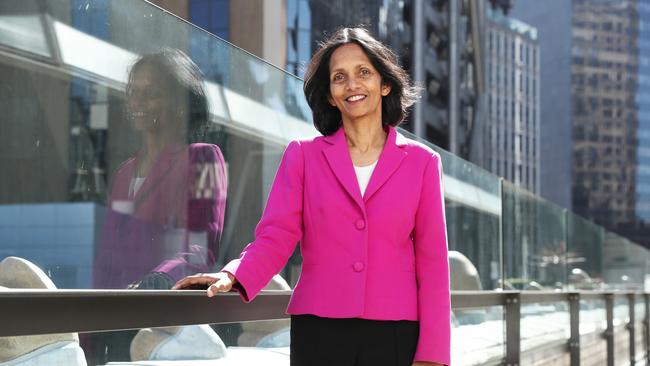Infrastructure deals picking up as growth holds up and rates peak
Macquarie sees signs of a pick-up in infrastructure deals as interest rates start to come down and economic growth holds up better than expected.

It is still early days but Macquarie sees signs of a pick-up in infrastructure deals as interest rates start to come down and economic growth holds up better than expected – although political uncertainty remains an issue before elections this year.
Speaking at Infrastructure Partnerships Australia annual conference in Sydney, Macquarie Group chief executive Shemara Wikramanayake backed the Reserve Bank’s less-aggressive approach to rate hikes as it sought to sustain job gains but said inflation was proving “sticky” as a result.
As with most economists, Macquarie’s view is that the RBA will be about six months behind other central banks with rate cuts, but economic growth is expected to pick up from recent sluggish levels as the tax cuts that took effect on July 1 are set to be followed by rate cuts in 2025.
“They’ve been approaching things slightly differently. The RBA didn’t hike rates as much as some of our peers around the world and that was because I think they were trying to sustain the employment pick-up that we had post-Covid and frankly that seems to have worked,” she said.
And while noting the impact of interest rate uncertainty on investor appetite for infrastructure deals after most central banks tightened monetary policy as inflation took off during the Covid-19 pandemic, Ms Wikramanayake is seeing signs of green shoots in deal flow.
“I think what’s been impacting things is that with interest rates going up, values of assets had been falling and that had a denominator effect and people were allocating away from private markets to public (markets) or having to allocate less to private markets. So fundraising got a bit slower for the infrastructure funds. What was taking 17 months to raise had started taking 30 months,” she said.
“Having said that, the investing also slowed because buyers and sellers couldn’t settle on meeting the expectation gap, as interest rates were still moving and they were waiting for rates to stabilise before deploying money.”
As a consequence the amount of so-called “dry powder” – money waiting to be deployed in infrastructure funds – has hit a record $US376bn ($561bn).
Deal flow has been expected to pick up for some time as interest rates stabilised in 2023 and were expected to start falling in 2024. However, an improvement this year was delayed by geopolitical factors, particularly in regard to an estimated 65 elections taking place around the globe this year.
High levels of government debt have also been a factor in limiting the availability of deals globally.
But more recently Macquarie has started to see deal flow improve.
“So our asset management team are saying that, from having seen a deal a month, it’s picked up to a deal a week and they are deploying more capital,” Mr Wikramanayake said.
“We’re seeing in this financial year more capital getting deployed.”
Macquarie’s corporate advisory team is also seeing a “very good pipeline” of deals.
The major US investment banks in their earnings reports last month also noted a decent pipeline of deals despite lingering caution about interest rates and geopolitical risks.
“So those are the sort of things in terms of cyclical issues and the interest rate cycle,” Wikramanayake said. “There’s also structural issues in terms of investment happening in Australia.”
In order to attract investors, infrastructure needed a degree of certainty in terms of the regulatory and investment environment, and Australia was “pretty well positioned on that scale on a global basis … we’re considered a safe economy to invest in,” she said.
“So we generally find if there are sectors that we are looking for capital in, this will be one of the places people like to deploy, because we’ve had a long history of private capital coming into infrastructure, and the regulatory side, the market side, the demographics here mean this is generally considered a pretty good place to invest in infrastructure.
“So there’s a structural factor which I think does weigh positively towards Australia.”
She said elections this year may affect appetite for infrastructure deals, as many governments had very high public debt as a result of Covid-era stimulus.
They were therefore more reliant on private capital for infrastructure to improve living standards or replace ageing assets.
Private capital was also needed for the energy transition and digitalisation, she said. “So we think, long-term, the structural need for private capital into infrastructure should persist.”
Notwithstanding US election uncertainty, US infrastructure investing was largely “driven at the state and local level” and the high level of public debt to GDP in the US made it very reliant on private capital, even after a major boost to public funding from the Inflation Reduction Act, she said.
“I know there is talk of Trump not wanting the Inflation Reduction Act to persist and it potentially was an Act with no limits, but there are a lot of projects up and running that I don’t think are going to get shut down and they’re waiting for things like permitting to allow them to happen,” she said.
“There’s certainly been an attraction of private capital into the US as a result of IJA and IRA that has some momentum to run regardless of government.”
She said Mr Trump’s policies of increasing tariffs, continuing tax cuts and slashing immigration might be “quite inflationary”, but in terms of investment in infrastructure, the structural environment that’s been created should continue to attract capital.
Meanwhile Australia was seeing significant interest in investing in infrastructure due to the maturity of its infrastructure assets, its track record, economic stability and demographics.
In terms of Australia’s climate transition projects, Macquarie was seeing strong interest from the biggest energy names globally, she said.




To join the conversation, please log in. Don't have an account? Register
Join the conversation, you are commenting as Logout